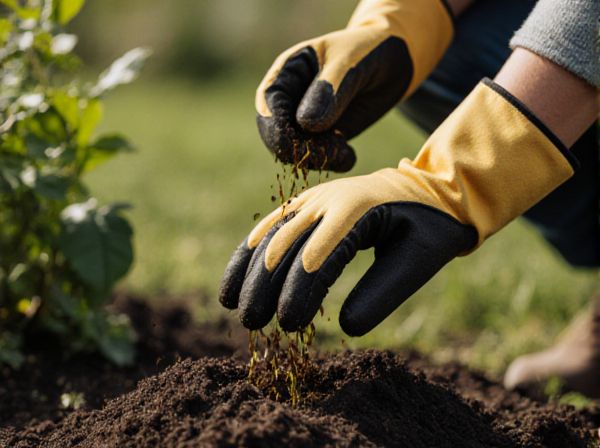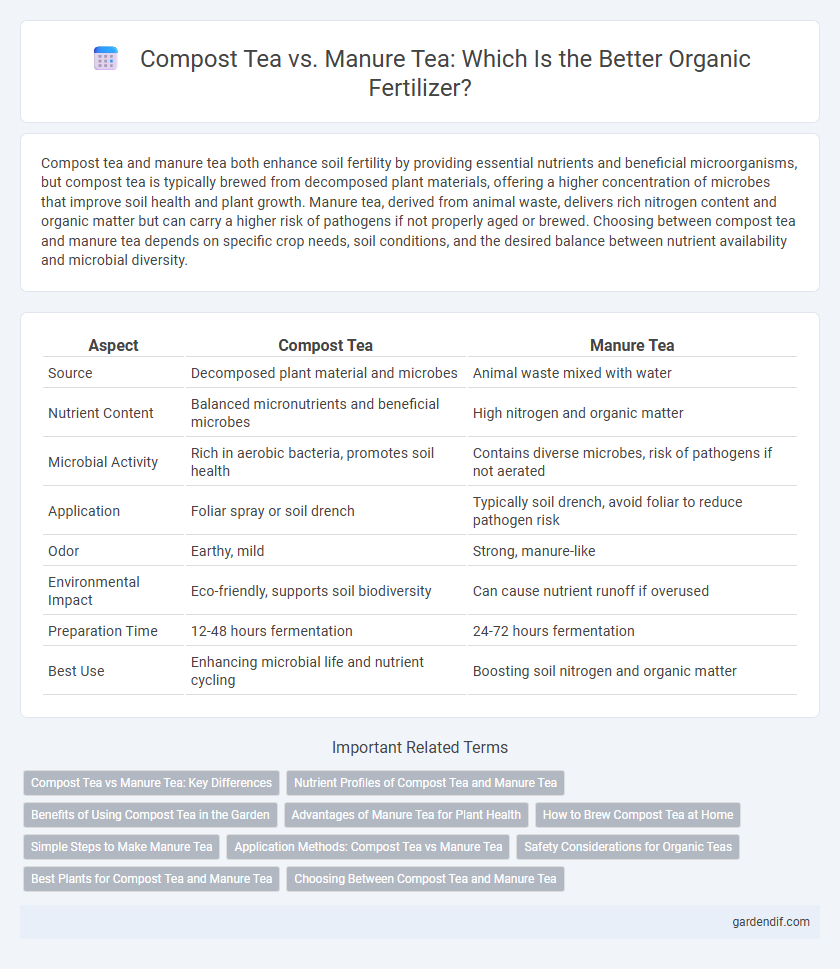
Compost tea vs Manure tea Illustration
Compost tea and manure tea both enhance soil fertility by providing essential nutrients and beneficial microorganisms, but compost tea is typically brewed from decomposed plant materials, offering a higher concentration of microbes that improve soil health and plant growth. Manure tea, derived from animal waste, delivers rich nitrogen content and organic matter but can carry a higher risk of pathogens if not properly aged or brewed. Choosing between compost tea and manure tea depends on specific crop needs, soil conditions, and the desired balance between nutrient availability and microbial diversity.
Table of Comparison
| Aspect | Compost Tea | Manure Tea |
|---|---|---|
| Source | Decomposed plant material and microbes | Animal waste mixed with water |
| Nutrient Content | Balanced micronutrients and beneficial microbes | High nitrogen and organic matter |
| Microbial Activity | Rich in aerobic bacteria, promotes soil health | Contains diverse microbes, risk of pathogens if not aerated |
| Application | Foliar spray or soil drench | Typically soil drench, avoid foliar to reduce pathogen risk |
| Odor | Earthy, mild | Strong, manure-like |
| Environmental Impact | Eco-friendly, supports soil biodiversity | Can cause nutrient runoff if overused |
| Preparation Time | 12-48 hours fermentation | 24-72 hours fermentation |
| Best Use | Enhancing microbial life and nutrient cycling | Boosting soil nitrogen and organic matter |
Compost Tea vs Manure Tea: Key Differences
Compost tea and manure tea both serve as organic fertilizers but differ significantly in composition and nutrient content. Compost tea is brewed from fully decomposed organic matter, offering a balanced mix of beneficial microbes and nutrients that enhance soil health and plant growth. Manure tea, made by steeping animal manure, tends to have higher nitrogen levels but may carry pathogens, requiring careful management to avoid plant damage.
Nutrient Profiles of Compost Tea and Manure Tea
Compost tea contains a diverse range of nutrients, including nitrogen, phosphorus, potassium, and micronutrients such as calcium, magnesium, and iron, which enhance soil fertility and microbial activity. Manure tea is typically richer in nitrogen and organic matter but may have higher variability in nutrient content depending on the animal source and composting process. Both teas improve soil health, but compost tea generally offers a more balanced and bioavailable nutrient profile for plant growth.
Benefits of Using Compost Tea in the Garden
Compost tea enhances soil health by delivering a rich blend of beneficial microorganisms that improve nutrient availability and promote plant growth. Its use increases disease resistance and supports a balanced soil ecosystem, reducing the need for chemical fertilizers and pesticides. Unlike manure tea, compost tea has lower risks of pathogens and nutrient imbalances, making it a safer and more sustainable choice for organic gardening.
Advantages of Manure Tea for Plant Health
Manure tea is rich in essential nutrients such as nitrogen, phosphorus, and potassium, which promote robust plant growth and improve soil fertility. It contains beneficial microbes and organic matter that enhance disease resistance and nutrient uptake in plants. The nutrient density and microbial diversity in manure tea contribute to healthier root systems and increased crop yields compared to compost tea.
How to Brew Compost Tea at Home
Brewing compost tea at home involves steeping high-quality compost in water, often with added oxygen to encourage beneficial microbial growth. Use a breathable container, an air pump with an aquarium stone for aeration, and brew the mixture for 24 to 48 hours to extract nutrients and microorganisms effectively. This nutrient-rich liquid fertilizer improves soil health and plant growth by introducing valuable microbes and organic matter directly to the root zone.
Simple Steps to Make Manure Tea
Manure tea is a nutrient-rich liquid fertilizer made by steeping animal manure in water, releasing minerals that enhance soil fertility. To make manure tea, place fresh or well-aged manure in a porous bag or container, submerge it in a bucket of water, and let it steep for 24 to 48 hours while stirring occasionally. Strain the mixture before applying it to plants, ensuring a balanced nutrient boost without the risks associated with raw manure applications.
Application Methods: Compost Tea vs Manure Tea
Compost tea is typically applied as a foliar spray or soil drench to promote microbial activity and disease suppression, while manure tea is often used as a nutrient-rich soil amendment to improve soil fertility and organic matter content. Compost tea's application requires aeration to maintain beneficial microbes, ensuring effective colonization on plant surfaces, whereas manure tea focuses on nutrient release and is often diluted to prevent phytotoxicity. Both methods enhance plant growth but demand different preparation and application frequencies based on their microbial and nutrient profiles.
Safety Considerations for Organic Teas
Compost tea offers a safer option compared to manure tea due to its lower risk of pathogen contamination, as it is typically brewed from fully decomposed organic matter. Manure tea carries a higher risk of harboring harmful bacteria such as E. coli and Salmonella, which can pose health threats if not properly treated or aged. Ensuring thorough aeration and monitoring brewing time are crucial steps to minimize microbial risks in both organic teas used as fertilizers.
Best Plants for Compost Tea and Manure Tea
Compost tea is ideal for nutrient-loving plants like tomatoes, peppers, and leafy greens due to its rich microbial content that enhances soil fertility and plant growth. Manure tea suits heavy feeders such as corn, squash, and root vegetables by providing substantial nitrogen, phosphorus, and potassium essential for robust development. Both teas improve soil health, but choosing compost tea benefits delicate plants requiring a balanced microbial ecosystem, while manure tea supports vigorous growth in nutrient-demanding crops.
Choosing Between Compost Tea and Manure Tea
Choosing between compost tea and manure tea depends on nutrient content, microbial diversity, and odor tolerance. Compost tea typically offers a balanced microbial population that enhances soil health and nutrient cycling, while manure tea contains higher nitrogen levels but may carry a stronger odor and potential pathogens. Prioritize compost tea for microbial enrichment and manure tea for rapid nutrient supplementation in crop fertilization.
Compost tea vs Manure tea Infographic

 gardendif.com
gardendif.com